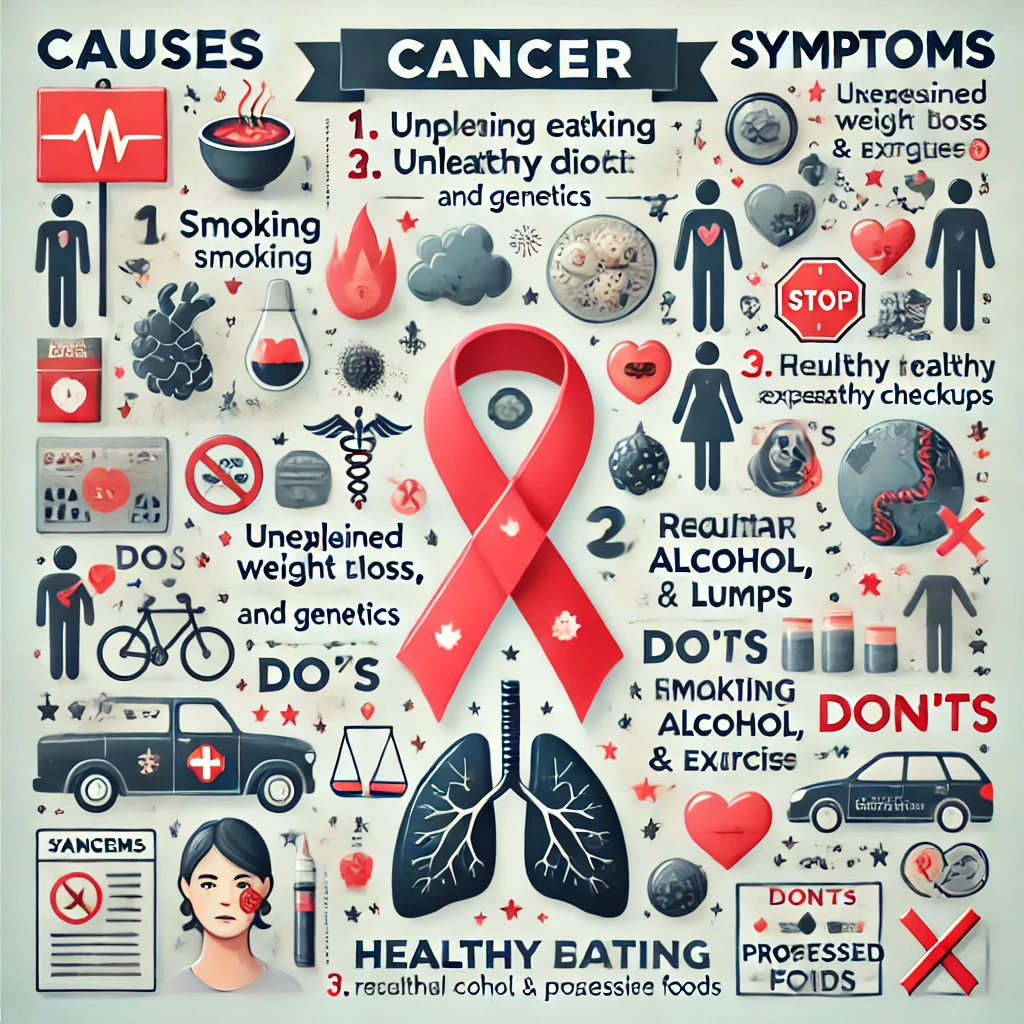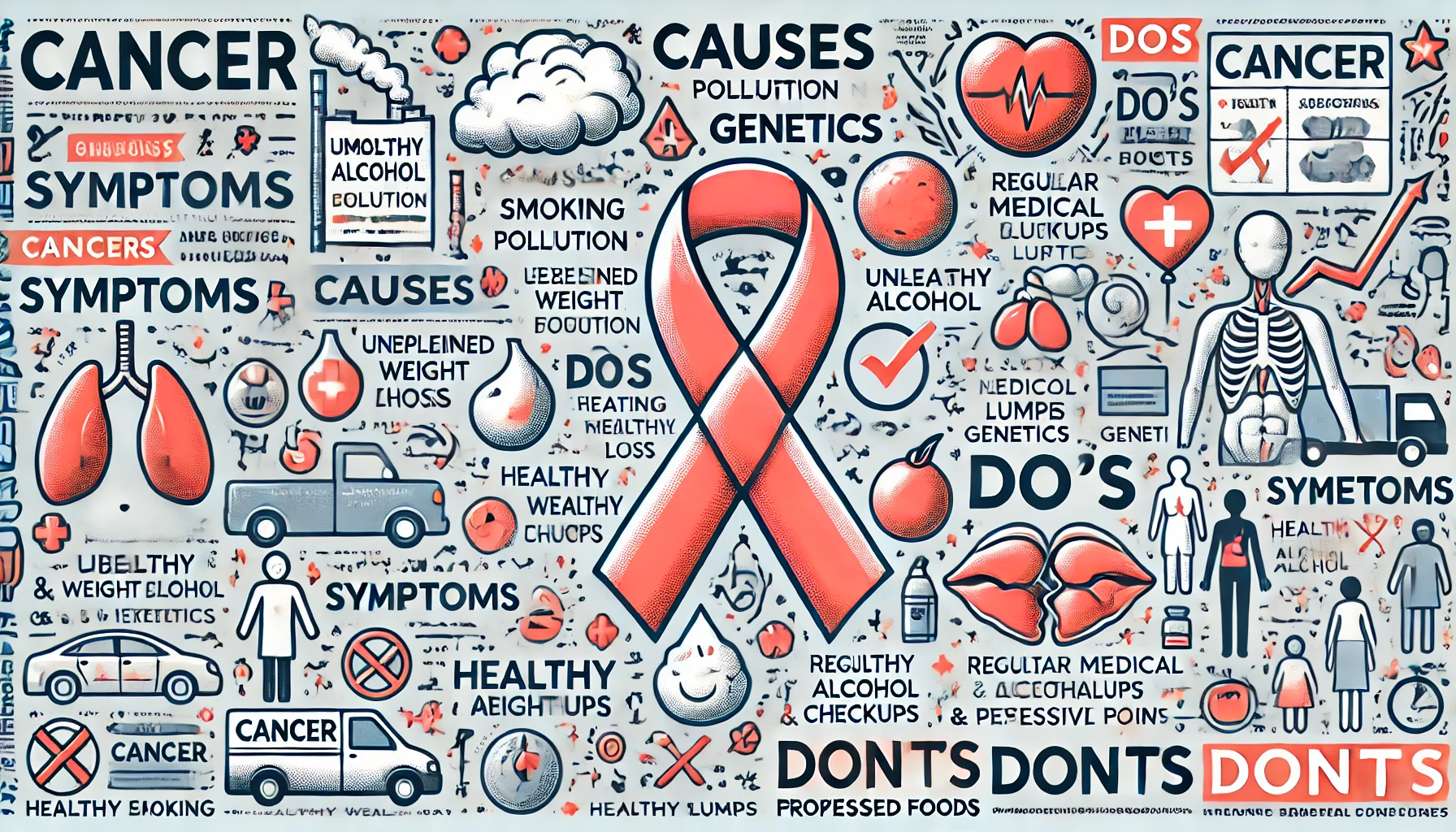Cancer is a complex and challenging disease that affects millions of people worldwide. While advances in medicine have improved detection and treatment, understanding the basics of cancer can empower individuals to take preventive measures and seek early intervention. Here’s a comprehensive guide to cancer, its causes, symptoms, and essential guidelines on what to do and what to avoid.
What Causes Cancer?
Cancer occurs when the body’s cells grow uncontrollably and invade other tissues. While the exact cause of cancer can vary, several risk factors contribute to its development:
- Genetic Mutations: Changes in DNA can trigger abnormal cell growth.
- Lifestyle Choices: Smoking, excessive alcohol consumption, poor diet, and lack of exercise can increase cancer risk.
- Environmental Factors: Exposure to harmful substances like radiation, asbestos, or certain chemicals can lead to cancer.
- Infections: Certain viruses and bacteria, such as HPV and H. pylori, are linked to specific types of cancer.
- Family History: A genetic predisposition can increase the likelihood of developing cancer.
Common Symptoms of Cancer
Recognizing early symptoms of cancer is crucial for timely diagnosis and treatment. While symptoms can vary based on the type and location of the cancer, common signs include:
- Unexplained weight loss
- Persistent fatigue
- Changes in skin appearance (e.g., new moles or unusual growths)
- Prolonged cough or difficulty breathing
- Persistent pain or discomfort
- Changes in bowel or bladder habits
- Unusual bleeding or discharge
- Lumps or swelling in any part of the body
If you notice any of these symptoms, consult a healthcare professional promptly.

What You Can Do
- Adopt a Healthy Lifestyle:
- Eat a balanced diet rich in fruits, vegetables, and whole grains.
- Engage in regular physical activity.
- Maintain a healthy weight.
- Avoid Tobacco and Limit Alcohol:
- Quit smoking and avoid exposure to secondhand smoke.
- Drink alcohol in moderation or not at all.
- Stay Informed and Vaccinated:
- Get vaccinated against cancer-related infections like HPV and hepatitis B.
- Educate yourself about cancer screening tests and attend regular check-ups.
- Protect Yourself from Harmful Exposures:
- Use sunscreen to guard against UV radiation.
- Avoid exposure to known carcinogens in the workplace or environment.
What You Should Avoid
- Ignoring Symptoms: Delay in seeking medical advice can worsen outcomes.
- Overexposure to UV Rays: Avoid tanning beds and excessive sun exposure.
- Unhealthy Diets: Limit processed foods, red meat, and sugary drinks.
- Stress and Neglecting Mental Health: Chronic stress can weaken your immune system.
Conclusion
Cancer is a formidable disease, but awareness and proactive measures can make a significant difference in prevention and management. By understanding its causes, recognizing symptoms, and making informed lifestyle choices, you can reduce your risk and contribute to early detection. If you or someone you know is affected by cancer, seek professional advice and support promptly. Together, we can fight cancer and improve outcomes for everyone.
Have questions or insights about cancer? Share your thoughts in the comments below.



